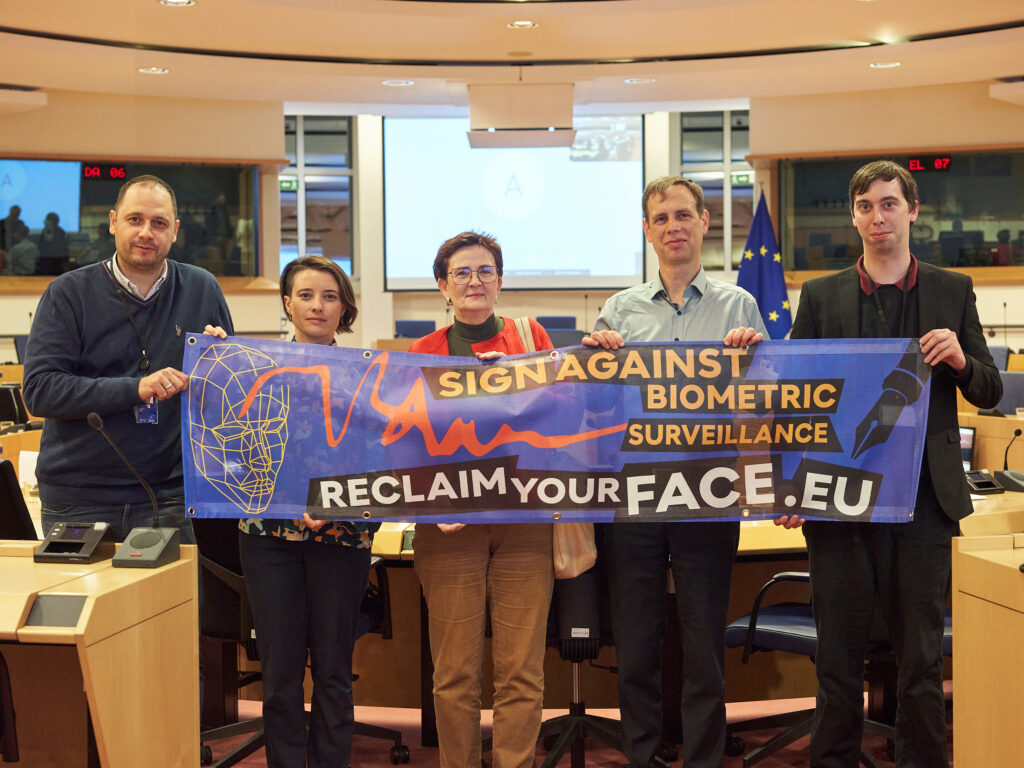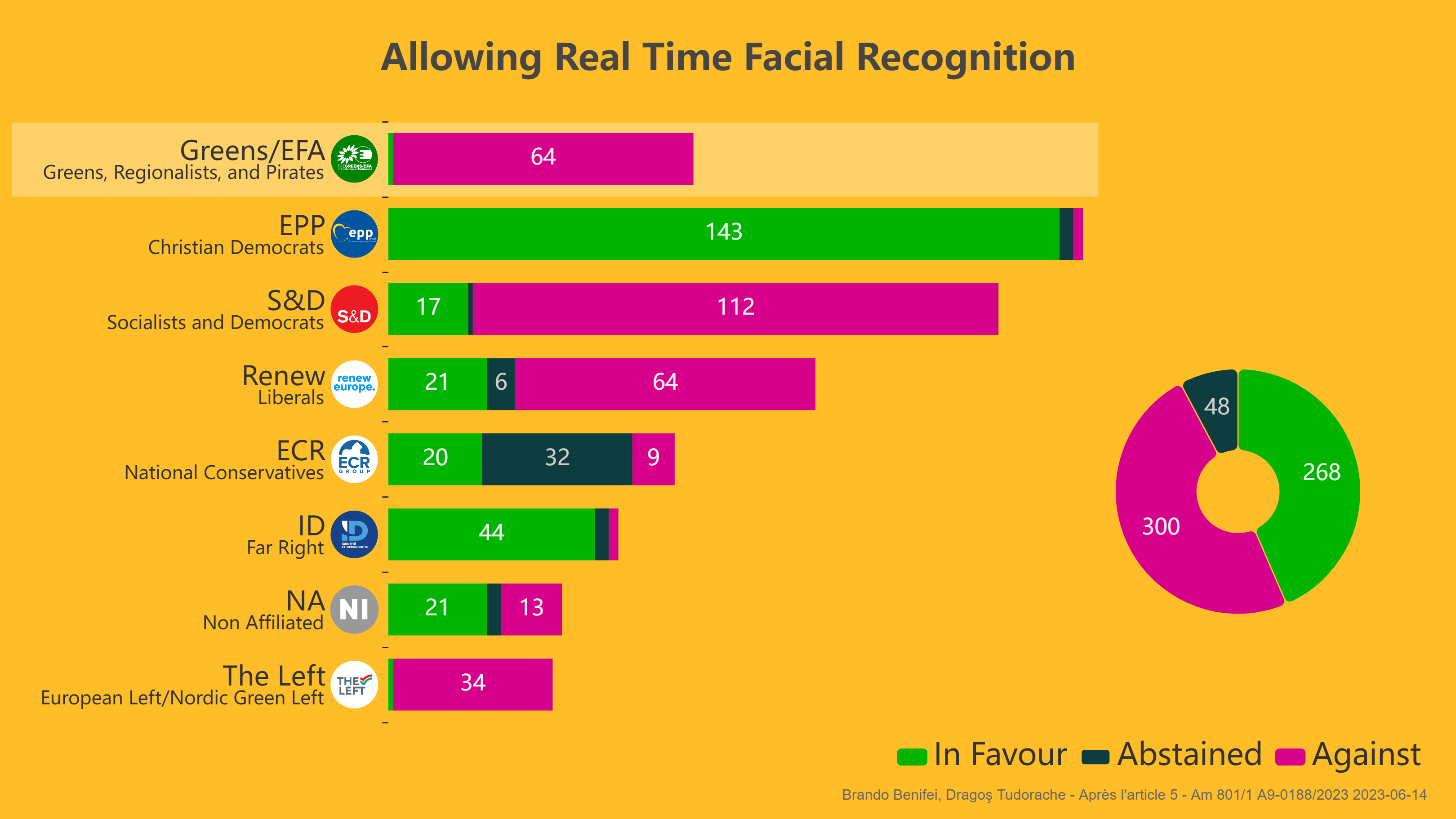Our fight continues
Throughout the EU, governments are experimenting with highly intrusive systems of facial recognition and other biometric mass surveillance in public spaces. Biometric surveillance systems encompass not only remote biometric identification, but also emotion recognition and biometric categorisation; all undermine the core of fundamental rights in different ways. Their implementation can create a feeling of constant surveillance, give the parties deploying biometric identification a position of uncontrollable power, and indirectly dissuade the exercise of the freedom of assembly and other fundamental rights, such as our freedom of speech and of information, our rights to privacy, to a fair trial and to non-discrimination.
Thus, biometric surveillance is an enormous breach of our right to privacy. It happens without our consent and its effects are chilling. Technology that tracks us throughout public space should simply not exist in a democratic society, nor should technology that assumes that we are nervous or stressed based on its own assessment, or that assumes that we are ‘abnormal’ based on how we dress, look or act.
Greens/EFA MEPs Patrick Breyer, Sergey Lagodinsky and Kim van Sparrentak tell us why it is more important than ever to continue fighting for our right to privacy.
Fighting for your right to privacy
But in the face of this looming threat, there are voices of resistance. For years, civil society organizations and the Greens/EFA have been at the forefront of the fight against biometric mass surveillance, recognizing the threat of such technology to our fundamental values and democracy.
We led the campaign, organised hearings, workshops, and public conversations with experts, screened documentaries, developed a video game, and producied campaign materials. This includes a video on 5 things you need to know about BMS, screened in cinemas and on social media.

Throughout our campaign, a strong collaboration with civil society was key to raising awareness and influence positions – we organised public events with shadows from other political groups, shared their articles and petitions and supported the European Citizens’ Initiative.
The campaign went to Italy and Greece to see the deployment of biometric surveillance and commissioned a YouGov representative survey on the public opinion on this topic in 10 EU countries, a study on BMS in Member States and a mapping of biometric surveillance projects in the EU. Ahead of crucial votes in the European Parliament, the Greens/EFA also mobilised other political groups and brought attention to dangerous situations. For example, we called out the dangerous the situation in France, where mass surveillance was to be allowed during the Olympics and where, some months later, the illegal use of facial recognition was disclosed. They also raised concerns about Serbia, where new laws on biometric surveillance threaten democratic rights and freedoms. We fought hard in the negotiations on the AI Act to make a ban on mass surveillance part of the regulation.

Our efforts have not gone unnoticed. In 2023, the European Parliament took a historic stand, calling for a full ban on biometric mass surveillance for law enforcement purposes. This landmark decision marked a significant victory for privacy advocates, but our work is far from over.
Indiscriminate surveillance of Europeans is a severe violation of everyone’s fundamental rights. This became part of the Parliaments position alongside with further regulation of AI technology.
After this, the negotiations on the AI Act started with the European Commission and the Member States (the so-called ‘trilogues’). Member States in the Council concluded negotiations in December 2023 and agreed to the text in February 2024. We expect the European Parliament to vote on it as early as March 2024.
Biometric Mass Surveillance: What about the bans?
The Greens/EFA negotiation team fought very hard to protect fundamental rights. We notably fought for a complete ban of real time biometric identification (best known as facial recognition) in public spaces throughout the trilogues.
Despite our best efforts, compromises had to be made during negotiations on the AI Act. While we pushed for a complete ban on real-time biometric identification in public spaces, we were met with resistance from Member States.
As a result, real time biometric facial recognition was banned except where several conditions are met. Among those conditions are requirements to request authorisation by a judicial or selected administrative authorities, a limitation of the use in time and location to what is necessary, fundamental rights impact assessment and registration of each use in a public database. The systems can only be used to search for specific persons, for example the suspects of specific criminal offences. However, in 2021 alone, more than 6,000 suspects of such offences were wanted by European Arrest Warrants issued by the judiciary.
As before the AI Act, it is for every Member State to decide whether to introduce real time remote biometric identification legislation. Any such national legislation will still have to comply with fundamental rights, which we believe prohibit biometric mass surveillance. Politically, however, some are concerned that the conditions set out in the AI Act will be used as an instruction manual and for legitimising the implementation of real time biometric identification schemes. They fear that the agreed conditions will make it politically difficult to continue generally opposing such schemes for their detrimental effects on our rights and our open society. Nevertheless, our position remains: regardless of the outcome of the AI Act we are determined to continue opposing such observation.
On remote biometric identification in post, that is based on recorded video data, the Greens/EFA first fought for a prohibition and later for very strict limitations but faced fierce opposition from Member States in the Council. As a compromise, while the technology is not banned, it will be listed as one of the high-risk AI use cases in Annex III and is therefore subject to the high-risk requirements. In addition, only a targeted search of a person will be possible and the documentation and logging of each use in police records, annual reports to market surveillance authorities and national data protection authorities will be required. Restricting of ex-post biometric identification to prosecution of serious crimes only, as desired by us, has regretfully not made it into the final AI Act text.
Due to our prolonged efforts, it has been clarified that Member States can introduce stricter conditions in both cases.
When it comes to emotion recognition and biometric categorisation practices, some use cases are banned in the final text following our pressure while others that we would have also liked to see there, are not (e.g. the police using questionable AI systems to predict who is or is not telling the truth).
Summing up: The fight to ban mass surveillance continues!
While some countries and cities – such as France and Hamburg in Germany – have started to roll out real time behavioural mass surveillance of public spaces, there is so far no national legislation that brings real-time biometric identification (face surveillance) to Europe. Our group will continue to fight any such plans politically, regardless of their conformity with the AI Act. The chilling effect and discrimination of biometric mass surveillance are unacceptable to us. If national legislation allowing for real time remote biometric identification in public spaces is ever passed, it should be contested in court for violating our fundamental rights.
A strong civil society movement to keep our public spaces free from biometric mass surveillance is now as vital as ever. Our Group assures key initiatives such as the Reclaim Your Face movement our continued and unwavering support and determination.